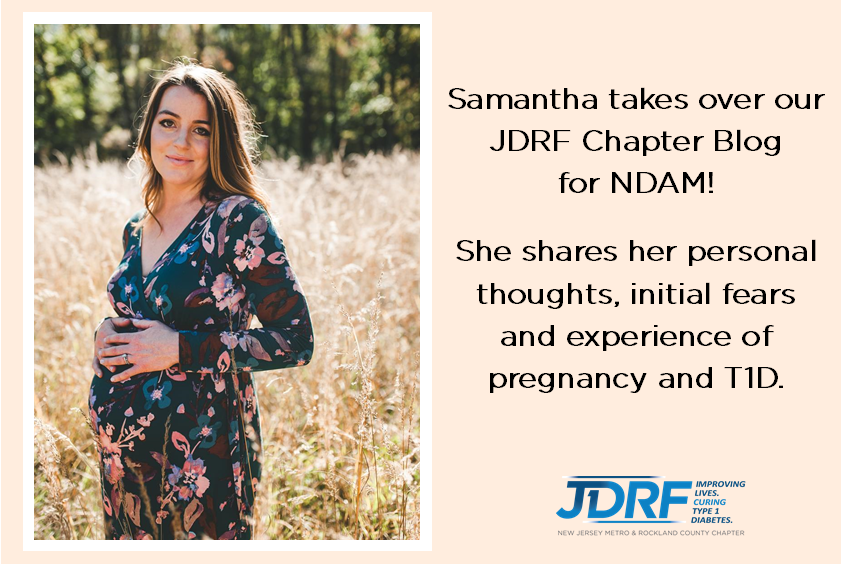
When I was diagnosed, at a relatively older age of 26, I had been newly married for just about 4 months. I had always wanted kids and hoped the ability to start a family was in the cards for me and my husband. However, a diagnosis of type 1 diabetes does not have the best track record when it comes to pregnancy especially for women with naturally occurring varying hormone levels throughout the month or during pregnancy. I couldn’t help but ask my doctors about the reality of type 1 diabetes and a healthy pregnancy. I was told that while not impossible, it is a lot of work and required even closer monitoring of my blood sugars. Through my research and speaking with my doctors, I came to the understanding that a range of complications with a type 1 pregnancy are real and common, and near perfect blood sugars are imperative right before conceiving and throughout the entire pregnancy.
Fast forward to March 2017, and I find out I’m pregnant! An immediate sense of excitement was shortly followed by a sense of fear. Fear that I would not be able to do what is necessary to keep my blood sugars in the appropriate ranges for my baby’s health and development. In the first and second trimester, there was an overwhelming sense of guilt whenever my blood glucose would be over 120 mg/dl. After hearing other stories, this seems to be a common thing among pregnant type 1 mothers. On top of all the other natural worries that come with being pregnant, type 1 diabetes adds many other anxieties and factors the mother needs to control.
With a short time to go before we meet our baby, I’ve learned that although pregnancy with type 1 diabetes is filled with lots of doctors’ appointments, checking your blood sugar and thinking about blood sugar a lot more than usual, I couldn’t have done it without the support of my husband and the help of my endocrinologist, high-risk obstetrician and continuous glucose monitor (CGM). I am so grateful for the ability to know my blood sugars at all times and where they are trending to be able to treat appropriately before they got out of control. I believe the CGM is what made it possible to keep my A1C at 5.3 for the past 10 months and to have a pregnancy without complications. Like this CONCEPTT study concludes, I highly recommend any woman with type 1 diabetes who is planning on having children to consider a CGM!
I hope that after reading this, any young woman who might have thought pregnancy with type 1 is impossible or too hard to handle, would learn from my experience that it is very possible to have a normal pregnancy and healthy baby. If I only knew nine months ago that non-prolonged high blood sugars have little to no effect on the baby or that having frequent doctor’s appointments means having the best care and monitoring for your baby (with the added bonus of seeing your baby in more frequent ultrasounds), I would not have been so anxious at the start.
For more information on the recent findings from Breakthrough T1D’s study on CGM use during pregnancy, click here. To request a Breakthrough T1D pregnancy toolkit, a great guide for parents-to-be, click here.
